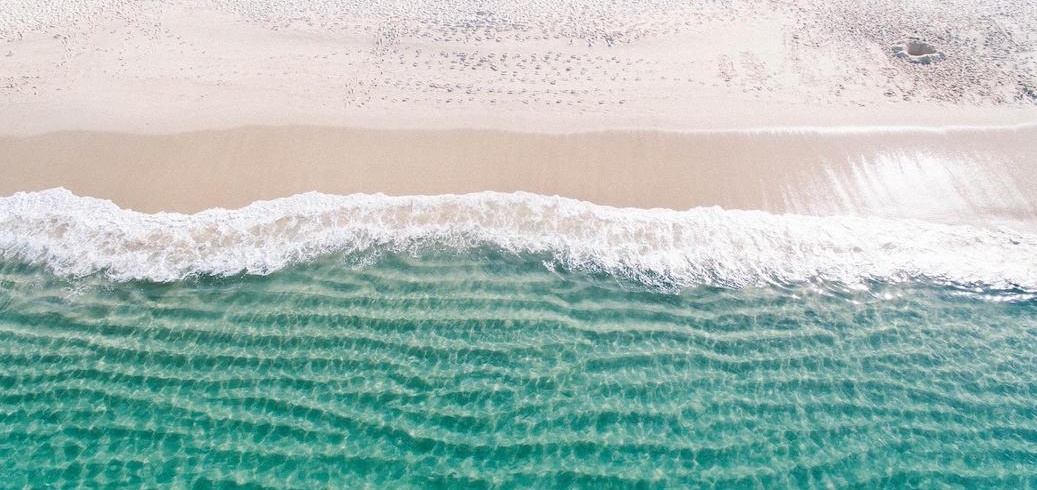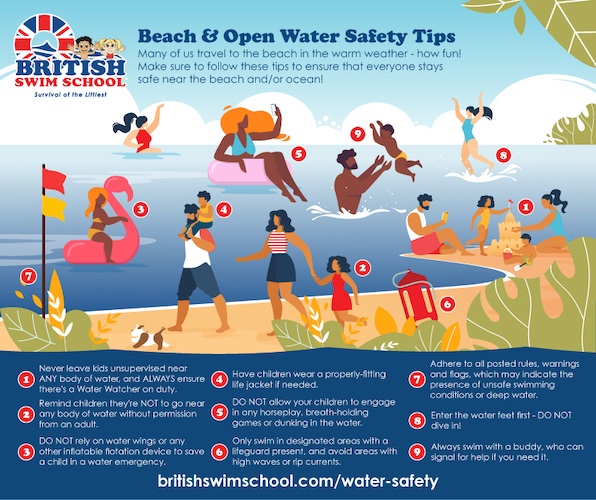Beach & Open Water Safety Tips

Tragically, people of all ages fatally drown in the ocean, lakes, rivers, reservoirs, and other types of open water. Learn how to enjoy open water swimming safely and responsibly!
Beach & Open Water Swimming Risks
While many water safety tips are universal, open water swimming comes with a unique set of risks and guidelines to protect against drowning. Here are a few common dangers!
- Water Temperature – Open water is generally much colder than indoor swimming pools, impacting an individual’s swimming ability. For inexperienced swimmers especially, the biggest concern is cold water shock, which can be swift and deadly. Common symptoms include shortness of breath, accelerated breathing rate, and increased heart pressure. When planning to swim outdoors in open water sources, dress for the water temperature as it can be dramatically different from the air temperature!
- Uncertain Weather – Uncertain weather conditions can make open water swimming dangerous. Strong winds and heavy rains can create unexpected currents or change the depth of the water. When you are planning to swim in an open water source, be sure to check the weather forecast before you leave home and again before getting into the water!
- Limited Visibility Conditions – Water in lakes, oceans, and other open water sources can be murky, creating conditions with limited visibility. As a result, potential hazards in the water can be hidden and unexpected. Additionally, it can become more challenging to locate a swimmer in danger and in need of assistance!
- Depth and Unexpected Drop Offs – Unlike swimming pools, open water sources are rarely marked with depths and they are often inconsistent. Additionally, shallow water can suddenly drop off to become very deep, quickly and unexpectedly. These hazards make it challenging to know if and when water will be over a swimmer’s head. Always jump in feet first or walk into the water to test the depth.
- Currents, Tides, and Waves – Open water sources often host strong and unpredictable currents, some of which can be below the surface and difficult to detect. Additionally, oceans and lakes will often have waves and rip currents that are dangerous without an understanding of how to escape their grasp. If you get caught in a rip current, swim parallel to the shore if you feel you’re being swept out!
Safety Tips for Open Water Swimming
While open water can be dangerous, it can also be a source of great joy and entertainment. Follow these tips to ensure everyone stays safe near the beach and other open water sources. The more you know, the safer you will be!
- Never leave swimmers unsupervised near ANY body of water, and ALWAYS ensure there is a qualified Water Watcher on duty.
- Remind children NOT to go near any body of water without permission from an adult.
- DO NOT rely on water wings or any other flotation device to save a child in a water emergency.
- Have children (and adults!) wear a properly-fitting life jacket if needed.
- DO NOT allow your children to engage in any horseplay, breath-holding games, or dunking in the water.
- Only swim in designated areas with a lifeguard present, and avoid areas with high waves or rip currents.
- Adhere to all posted rules, warnings, and flags, which may indicate the presence of unsafe swimming conditions or deep water.
- Enter the water feet first – DO NOT dive in!
- Always swim with a buddy who can signal for help if you need it.
(Click infographic to enlarge.)

